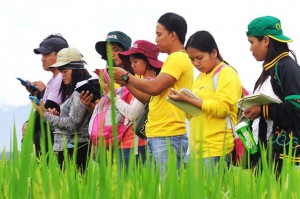The Department of Agriculture and its partner institutions are pilot-testing a new training curriculum that aims to mold new breed of extension workers called AgRiDOC or Agricultural Development Officers of the Community. 
As a pilot-test to 25 extensionists in Luzon, the training curriculum consists of six modules covering principles and values of transformational leadership and development work, interactions with agriculture advocates, coping mechanisms in the extension system, and modern technologies such as PalayCheck and Palayamanan.
Dr. Karen Eloisa T. Barroga, project leader of the Improving Technology Promotion and Delivery through Capability Enhancement of Next-Gen Rice Extension Professionals and Other Intermediaries (IPaD), said that the new training curriculum is based on consultations with stakeholders and agricultural extension experts nationwide.
Unlike old training programs that usually start with the state of the rice industry or the morphology and growth phases of the rice plant, the new curriculum primes the extensionists with the principles and values of transformational leadership. Barroga said that this training modification aims to mold the AgRiDOC as catalysts with broader role in development.
“As we rounded the country during our stakeholders’ meetings, we were advised to heighten understanding and appreciation of the development or transformation process among the AgRiDOC,” Barroga said.
The six modules on their pilot-test from November 2014 to April this year are creatively titled as Be Transformed, AgRiCool, AgRiSurvivors, PalaYcheck & PalaYamanan v2.0, Rise with Rice, and Be RICEponsible.
Barroga said that the Be Transformed module guides the trainees on realizing the importance of learning and working together as members of a community and of God’s Kingdom.
In the AgRiCool module, the trainees converse with people who have transformed communities and have championed agriculture and rice. They are exposed to ICT-based rice extension tools and resources and are introduced to agencies that they could partner with in development programs.
In taking the AgRiSurvivor module, trainees are deployed to farm families and in communities to understand and appreciate the types of rice farmers and extension intermediaries and learn about their coping mechanisms to survive in the industry.
“Under the PalaYcheck and PalaYamanan v.2.0 module, the trainees’ are expected to have better understanding on the principles of diversification, intensification, and integration in a rice-based farming system; technology localization; skills in field problem diagnosis and management; and knowledge of nature-inspired and high-tech farming practices,” Barroga said.
The communication education expert at the Philippine Rice Research Institute (PhilRice) said that the trainees are required to establish and maintain vegetable and rice plots at FutureRice Boot Camp in the PhilRice experimental station in Nueva Ecija.
Trainees are also deployed in the farmers’ fields in Nueva Ecija, Aurora, and Nueva Vizcaya to hone and test their skills on field problem diagnosis using ICT-based extension tools such as Rice Doctor and the Rice Crop Manager.
Meanwhile , the AgRiDOC trainees learn about entrepreneurship and values on development work , and gain competencies on project proposal preparation, financial management, and clear and effective writing in the Rise with Rice and Be RICEponsible modules.
PhilRice retiree and experts from Bureau of Fisheries and Aquatic Resources, Central Luzon State University, and Daisy Duran’s Farm and Agribusiness Training Center, are among the trainers.




